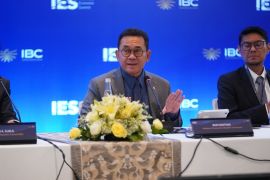"We can no longer avoid the tide of globalization and digitalization. What has caused our declining sales is our delay in adapting to the current situation, particularly the rise of digitalization in our own country," he said during a visit to Kebayoran Lama Market, South Jakarta, on Tuesday.
He pointed to the shift in people's consumption patterns, noting that smartphones and the Internet have made it easier for people to shop online.
For that reason, he said, now is not the time to separate or stop the tradition of shopping in traditional markets, but to utilize both sales methods -- conventional and digital.
According to the minister, market vendors could use a QR-based payment system and digital sales methods.
"Do not consider this new pattern an enemy or opponent; we invite related parties to cooperate so that online shopping patterns can help increase business turnover," he said.
In addition, his ministry has created the SAPA UMKM digital platform to support the digitalization and development of MSMEs in Indonesia.
The platform is expected to be a solution for MSME players to tackle various challenges, such as complicated bureaucracy, difficult access to financing, and lack of data integration.
"We also built the SAPA UMKM system to be a digital marketplace for MSME players with a very low cost. Thus, the people's economy could grow," the minister added.
In addition, the Ministry of MSMEs has been a strategic partner supporting cooperation between the MSME digital platform MPStore and the Indonesian Market Vendors Association (IKAPPI) to accelerate digital adoption by traditional market vendors.
Related news: Digital transformation key to unlocking MSME growth: Minister Hafid
Related news: Govt committed to MSME advancement: Hartarto
Translator: Arnidhya Nur, Raka Adji
Editor: Primayanti
Copyright © ANTARA 2025












